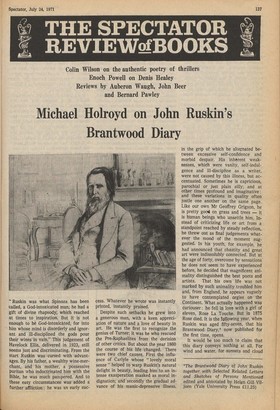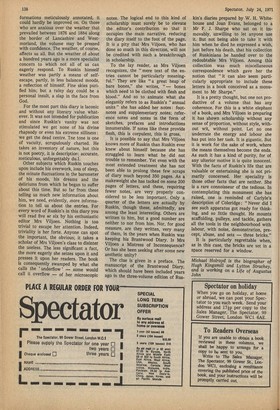Michael Holroyd on John Ruskin's Brantwood Diary
*The Brantwood Diary of John Ruskin together with Selected Related Letters and Sketches of Persons Mentioned edited and annotated by Helen Gill Viljoen (Yale University Press £11.25) "Ruskin was what Spinoza has been called, a God-intoxicated man; he had a gift of divine rhapsody, which reached at times to inspiration. But it is not enough to be God-intoxicated, for into him whose mind is disorderly and ignorant and ill-disciplined the gods pour their wines in vain." This judgement of Havelock Ellis, delivered in 1923, still seems just and discriminating. From the start Ruskin was cursed with advantages. By his father, a wealthy wine-merchant, and his mother, a possessive puritan who indoctrinated him with the Bible, he was much pampered. And to these easy circumstances was added a further affliction: he was an early suc cess. Whatever he wrote was instantly printed, instantly praised.
Despite such setbacks he grew into a generous man, with a keen appreciation of nature and a love of beauty in art. He was the first to recognize the genius of Turner; it was he who rescued the Pre-Raphaelites from the derision of other critics. But about the year 1860 the course of his life changed. There were two chief causes. First the influence of Carlyle whose " lovely moral sense" helped to warp Ruskin's natural delight in beauty, leading him to an intense exasperation masked as moral indignation; and secondly the gradual advance of his manic-depressive illness, in the grip of which he alternated between excessive self-confidence and morbid despair. His inherent weak nesses, which were vanity, self-indulgence and ill-discipline as a writer, were not caused by this illness, but accentuated. Sometimes he is capricious, parochial or just plain silly; and at other times profound and imaginative : and these variations in quality often jostle one another on the same page.
Like our own Mr Geoffrey Grigson, he is pretty good on grass and trees — it is human beings who unsettle him. In stead of criticizing life or art from a standpoint reached by steady reflection, he threw out as final judgements what ever the mood of the moment sug gested. In his youth, for example, he had announced that chastity and great art were indissolubly connected. But at the age of forty, overcome by sensations he does not seem to have experienced before, he decided that magnificent ani mality distinguished the best poets and artists. That his own life was not marked by such animality troubled him and, from England, he appears vaguely to have contemplated orgies on the Continent. What actually happened was curiouser : he fell in love with a girl of eleven, Rose La Touche. But in 1875 Rose died. It is the following year, when Ruskin was aged fifty-seven, that his Brantwood Diary,* now published for the first time, opens.
It would be too much to claim that this diary conveys nothing at all. For wind and water, for sunsets and cloud formations meticulously annotated, it could hardly be improved on. On those who are anxious over the weather that prevailed between 1876 and 1884 along the border of Lancashire and Westmorland, the volume may be pressed with confidence. The weather, of course, affects us all. But the weather of about a hundred years ago is a more specialist concern to which not all of us can eagerly respond. To Ruskin himself weather was partly a means of selfescape, partly, in less balanced moods, a reflection of himself. Fine skies purified him; but a rainy day could be a personal insult, a slap in the face from God.
For the most part this diary is laconic and without any literary value whatever. It was not intended for publication and since Ruskin's vanity was not stimulated we get none of his divine rhapsody or even his extreme silliness : we get the dead centre. Tne tone is one of vacuity, scrupulously charted. He takes an inventory of nature, but this is not poetry, it is description: accurate, meticulous, unforgettably du.l.
Other subjects which Ruskin touches upon include his overwork, loss of sleep, the minute fluctuations in the barometer of his moods, his dreams and the deliriums from which he began to suffer about this time. But so far from these telling us much new information about him, we need, evidently, more information to tell us about the entries. For every word of Ruskin's in this diary you will read five er six by his enthusiastic editor Mrs Viljoen. Nothing is too trivial to escape her attention. Indeed, triviality is her forte. Anyone can spot the important, the obvious; it takes a scholar of Mrs Viljoen's class to disinter the useless. The less significant a fact, the more eagerly she seizes upon it and presses it upon her readers. The book is consequently swamped by what she calls the ' underflow ' — some would call it overflow — of her microscopic notes. The logical end to this kind of scholarship must surely be to elevate the editor's contribution so that it occupies the main narrative, reducing the diary itself to the foot of the page. It is a pity that Mrs Viljoen, who has done so much in this direction, will not be credited with such a breakthrough in scholarship.
To the lay reader, as Mrs Viljoen recognizes, the "mere text of the entries cannot be particularly meaningful." They are like "a great heap of bare bones," she writes, " — bones which need to be clothed with flesh and blood." And so to animate what she elegantly refers to as Ruskin's "annual units" she has added her notes : footnotes and supplementary notes; reference notes and notes in the form of sketches, prefaces and introductions innumerable. If notes like these provide flesh, this is corpulent, this is gross.
It is possible to say that Mrs Viljoen knows more of Ruskin than Ruskin ever knew about himself because she has struggled to learn what he did not trouble to remember. Yet even with the most extended treatment she has not been able to prolong these few scraps of diary much beyond 350 pages. As a makeweight she has tacked on some 200 pages of letters, and these, requiring fewer notes, are very properly considered to be less important. Only a quarter of the letters are actually by Ruskin, though these, admittedly, are among the least interesting. Others are written to him, but a good number are neither to nor from him. Nor, for good measure, are they written, very many of them, in the years when Ruskin was keeping his Brantwood Diary. Is Mrs Viljoen a Mistress of Inconsequence? Or has she been seeking after some new aesthetic unity?
The clue is given in a preface. The manuscript of the Brantwood Diary, which should have been included years ago in the three-volume edition of Rus kin's diaries prepared by W. H. Whitehouse and Joan Evans, belonged to a Mr F. J. Sharpe who sat on it immovably, unwilling to let anyone use it. But not being able to take it with him when he died he expressed a wish, just before his death, that his collection of Ruskiniana be handed over to the redoubtable Mrs Viljoen. Among this collection was much miscellaneous correspondence which gave her the notion that "it can also seem particularly appropriate to include these letters in a book conceived as a monument to Mr Sharpe."
It is a pretty thought, but one not productive of a volume that has any coherence. For this is a white elephant of a book, and Mrs Viljoen in preparing it has shown scholarship without any sense of proportion, without style, without wit, without point. Let no one underrate the energy and labour she has put into her task. It is gigantic. But it is work for the sake of work, where the means themselves become the ends. As such it has a kind of purity, for of any ulterior motive it is quite innocent. With the facts of Ruskin's life that are valuable or entertaining she is not primarily concerned. Her speciality is those other facts that are neither. She is a rare connoisseur of the tedious. In contemplating this monument she has raised, one is reminded of Carlyle's description of Coleridge : "Never did I see such apparatus got ready for thinking, and so little thought. He mounts scaffolding, pulleys, and tackle, gathers all the tools in the neighbourhood with labour, with noise, demonstration, precept, abuse, and sets — three bricks."
It is particularly regrettable when, as in this case, the bricks are set in a space reserved for a window.
Michael Holroyd is the biographer of Hugh Kingsmill and Lytton Strachey, and is working on a Life of Augustus John











































 Previous page
Previous page